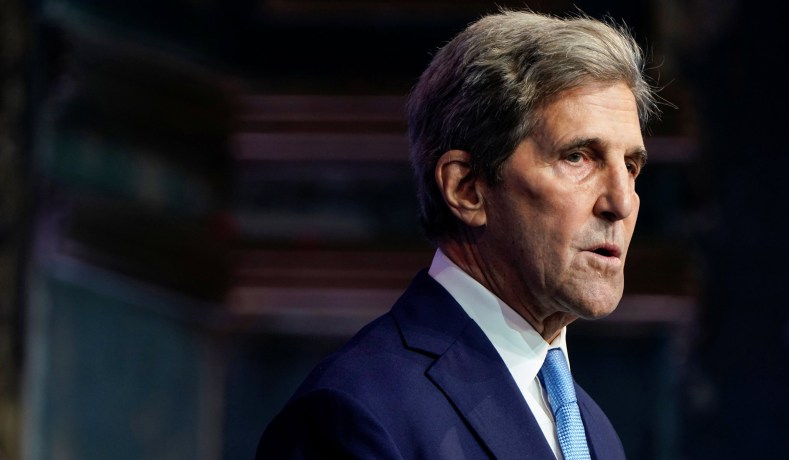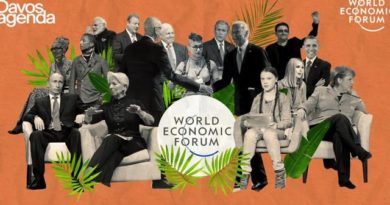John Kerry, Davos, and the ‘Great Reset’

Last year, the World Economic Forum (“Davos”) announced that it was launching what it modestly referred to as the “Great Reset” initiative:
There is an urgent need for global stakeholders to cooperate in simultaneously managing the direct consequences of the COVID-19 crisis. To improve the state of the world, the World Economic Forum is starting The Great Reset initiative.
As I wrote in October:
Even if we pass over the presumption of the reset’s name, this is a small classic of the prose of soft authoritarianism. There is an “urgent need” that must be met. There is to be cooperation and management, the world is to be “improved,” and all of this is to be put in place by “global stakeholders,” — a conveniently vague phrase, with more than a suggestion of democracy bypassed about it.
As Klaus Schwab, the WEF’s founder and executive chairman, has made clear, the Great Reset is nothing if not ambitious:
The world must act jointly and swiftly to revamp all aspects of our societies and economies, from education to social contracts and working conditions. Every country, from the United States to China, must participate, and every industry, from oil and gas to tech, must be transformed. In short, we need a “Great Reset” of capitalism.
Writing back in October, I wondered why, given the mess that so many governments had made of their response to COVID-19, it was capitalism that needed a reset. The reality, of course, is that COVID-19 is just the latest excuse for Schwab to renew his longstanding campaign to replace free market capitalism with “stakeholder capitalism”. Stakeholder capitalism is (to put it too briefly) an expression of corporatism, an ideology that can be benign (as in post-war West Germany) or almost infinitely malign: It was, to varying degrees, an important part of fascist theory (if not always practice) in the interwar years and, in countries such as Spain, Portugal, and Argentina, for much longer still.
In fact, contemporary China is, in many respects, closer to being a corporatist than a Communist state.
Under the circumstances, perhaps we should not be surprised that on Monday, China’s Xi was an honored speaker at the “virtual” Davos being held this week. (The Wall Street Journal reported that “The Davos website effused that this was a ‘historic opportunity for collaboration.’”)
To be fair, as I noted in October, the WEF has not come up with its ideas in isolation:
The WEF acts as an amplifier and supporter of the soft authoritarianism of the globalist governing class in waiting — and not always in waiting. But it is a part of that ecosystem, not its controller. And the Great Reset is both a product of Schwab’s imagination and a summary of the corporatist ideas that have been floating around that class for a long time, from the focus on stakeholders, to the often cranky environmentalism, to the rejection of shareholder primacy . . .
Under the circumstances, this article in The Hill by Justin Haskins (from December, but I just saw it in a retweet) isn’t entirely reassuring:
At a panel discussion about the Great Reset hosted by the World Economic Forum in mid-November, former Secretary of State John Kerry — Biden’s would-be special presidential envoy for climate – firmly declared that the Biden administration will support the Great Reset and that the Great Reset “will happen with greater speed and with greater intensity than a lot of people might imagine.”
When asked by panel host Borge Brende whether the World Economic Forum and other Great Reset supporters are “expecting too much too soon from the new president, or is he going to deliver first day on this [sic] topics?,” Kerry responded, “The answer to your question is, no, you’re not expecting too much.”
“And yes, it [the Great Reset] will happen,” Kerry continued. “And I think it will happen with greater speed and with greater intensity than a lot of people might imagine. In effect, the citizens of the United States have just done a Great Reset. We’ve done a Great Reset. And it was a record level of voting.”
Kerry later argued that the Great Reset is necessary to slow the “climate crisis” and that “I know Joe Biden believes . . . it’s not enough just to rejoin Paris [the Paris Climate Accords] for the United States. It’s not enough for us to just do the minimum of what Paris requires.”
Kerry is, of course, now our climate czar, a suitably autocratic nickname for a role that is likely to involve an agenda with more than a touch of authoritarianism about it. Interestingly, he is combining that job with a seat on the National Security Council.
And we have already seen, via a series of pronouncements and executive orders, that the Biden administration will go far further than the Paris climate accords require.
But it is worth also reading the next paragraph of Haskins’s article:
Kerry also said that because of the Great Reset movement, he believes “we’re at the dawn of an extremely exciting time” and that “the greatest opportunity we have” to address social and economic problems is “dealing with the climate crisis.”
Never let a (climate) “crisis” go to waste.
*** This article has been archived for your research. The original version from National Review can be found here ***


